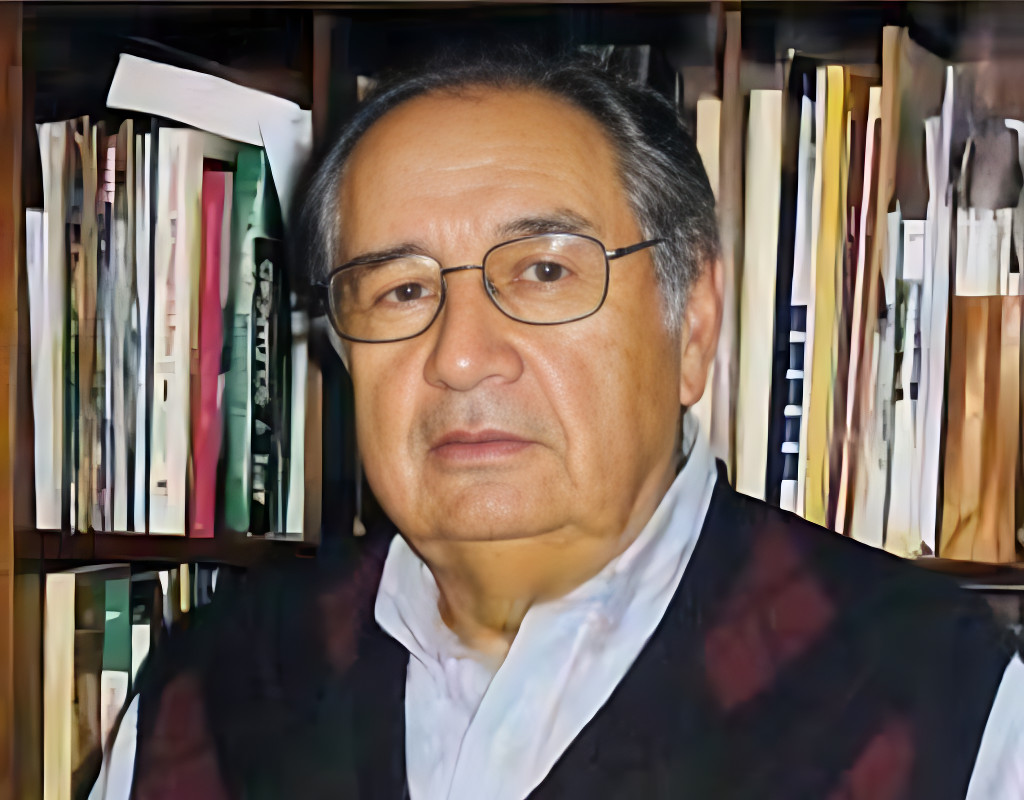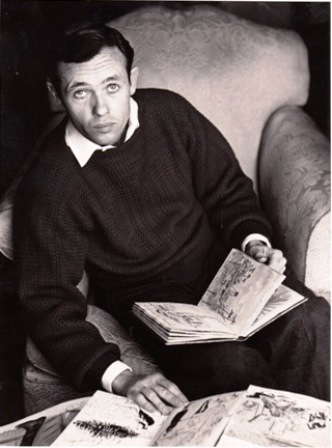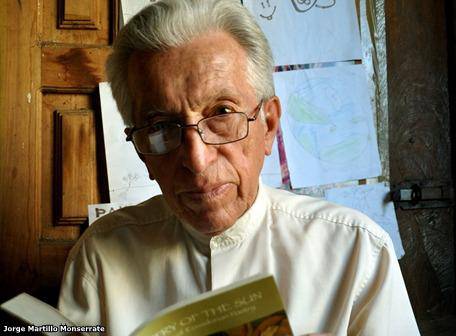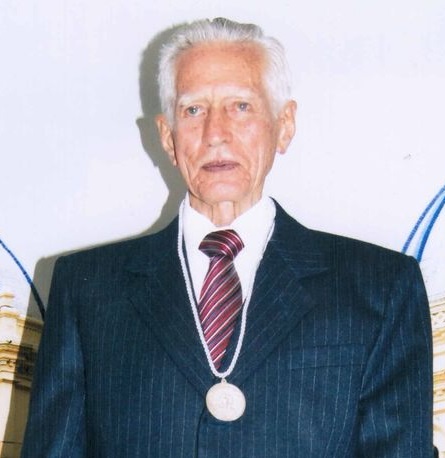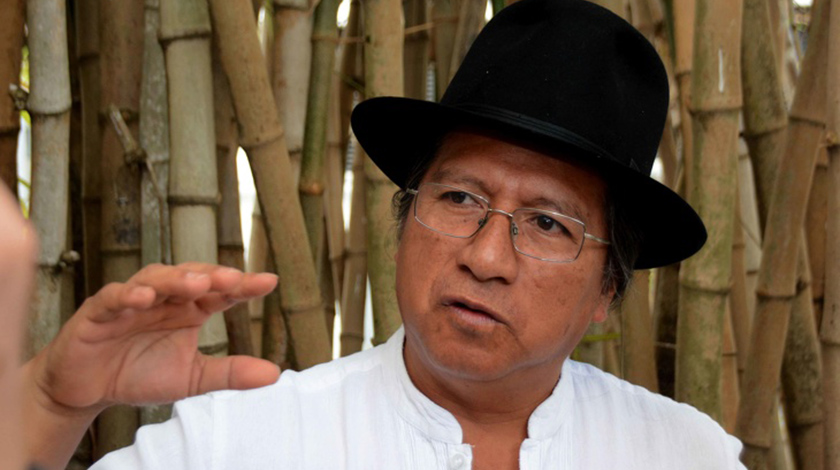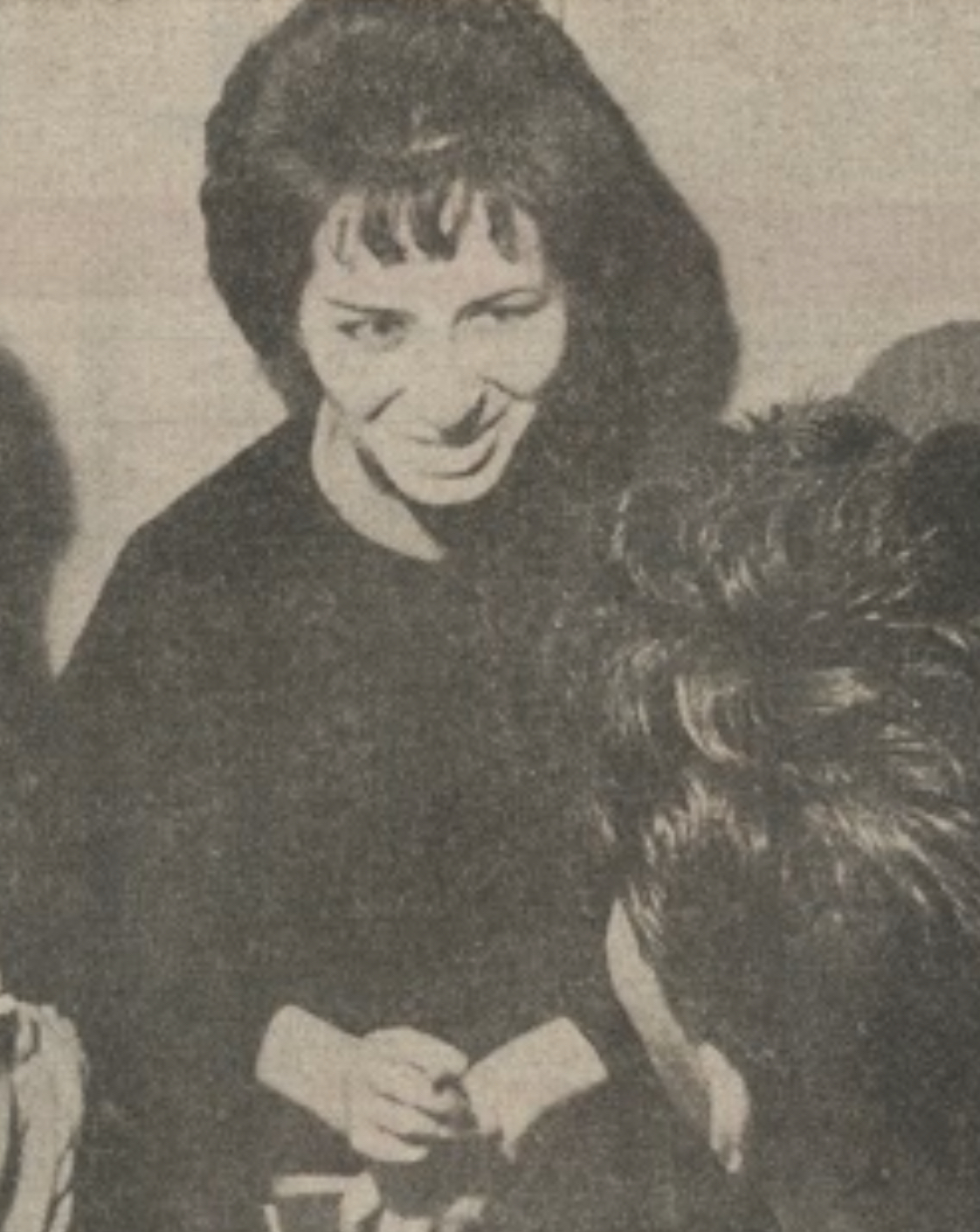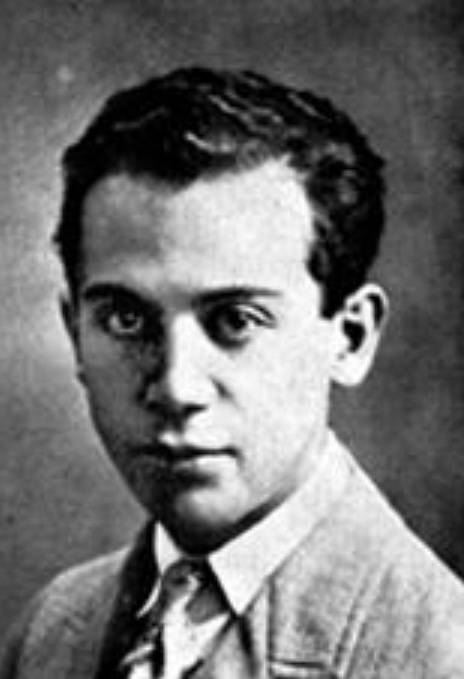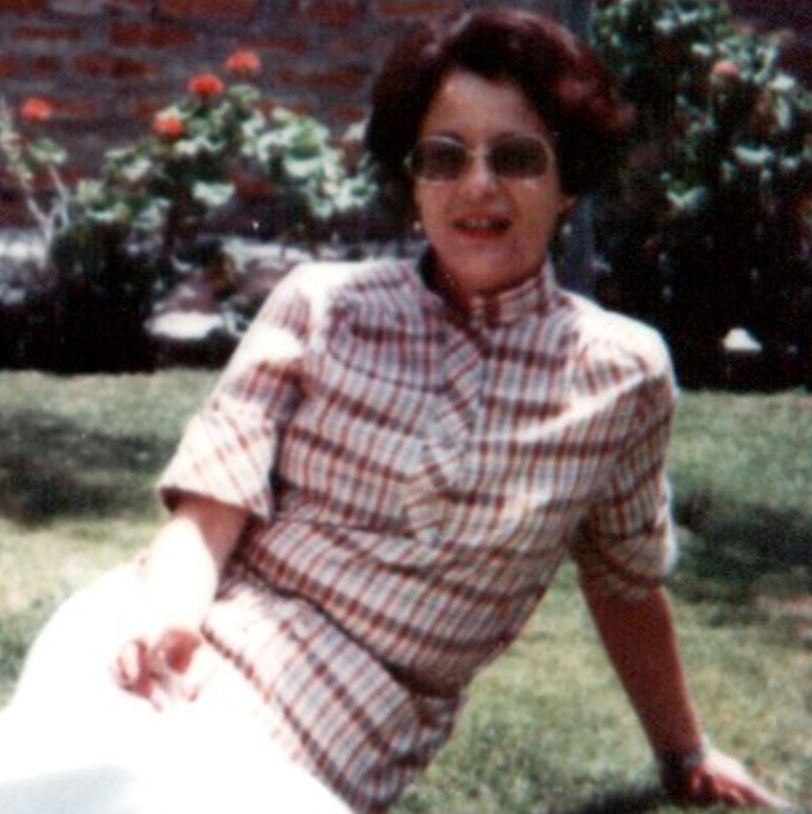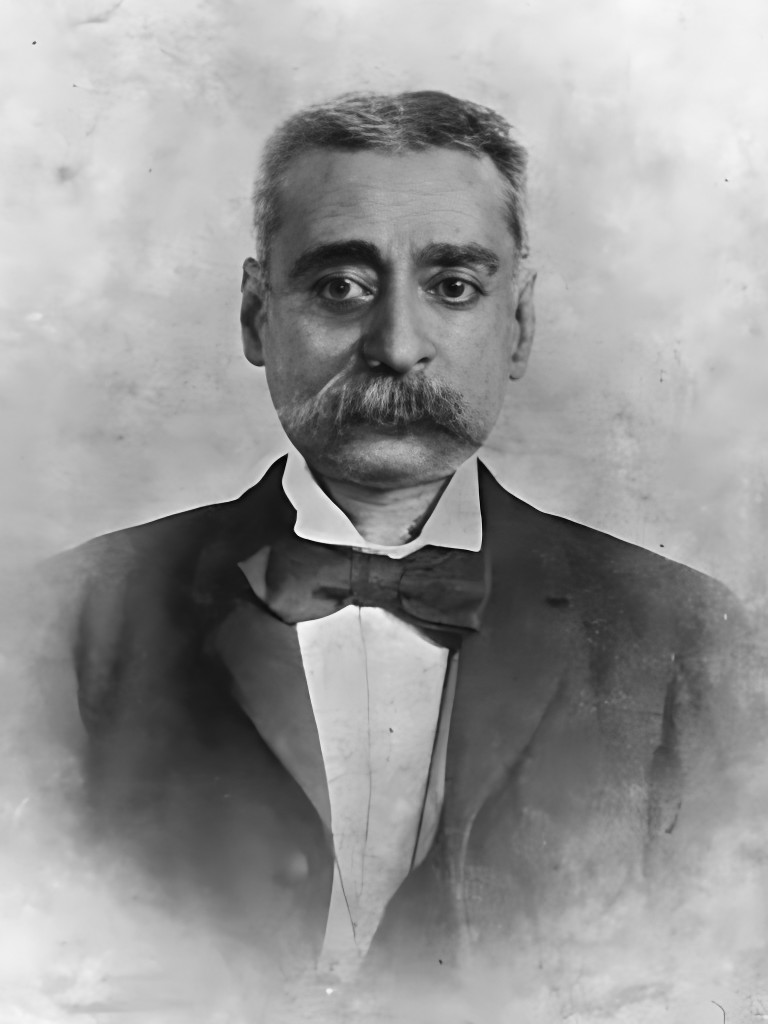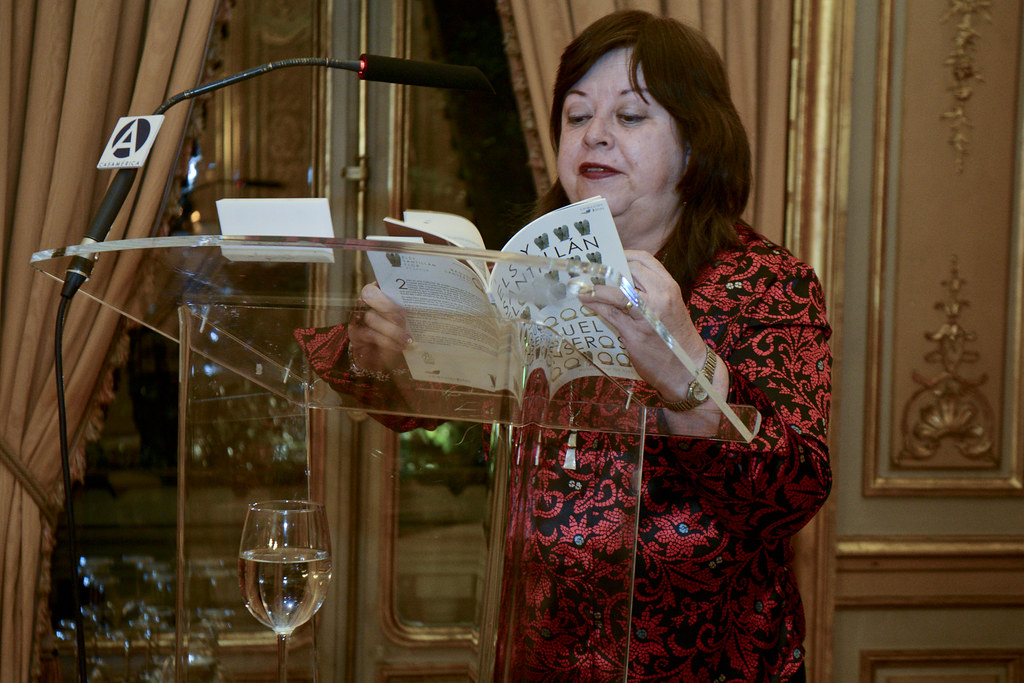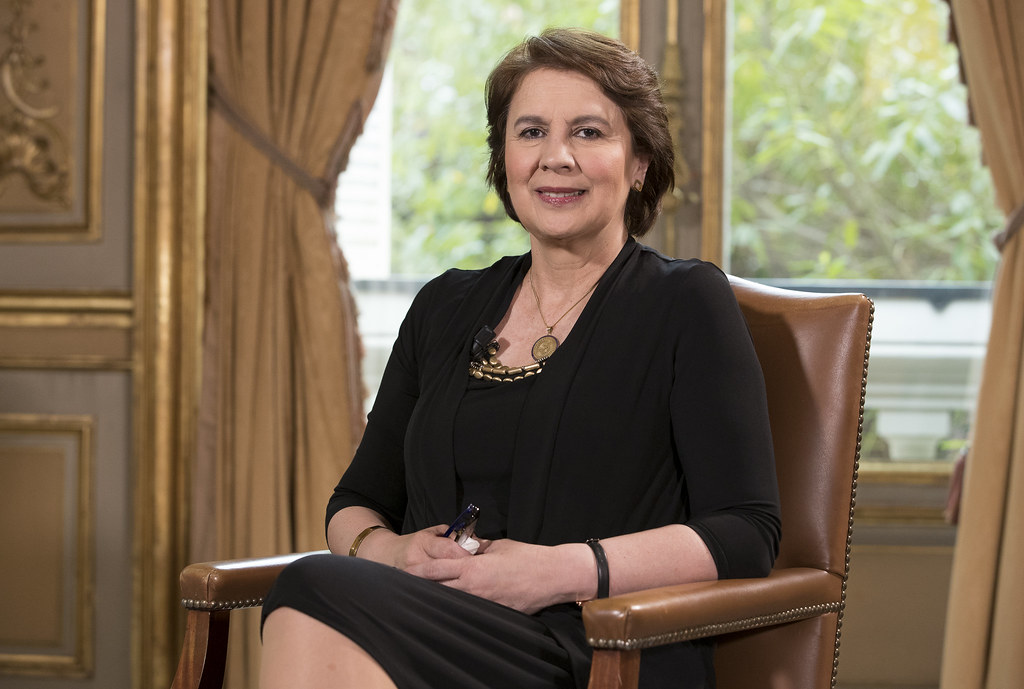Antonio Sacoto Salamea (Biblián, Cañar, Ecuador, November 30, 1932) is an Ecuadorian literary critic, essayist, and university professor. He has a PhD from Columbia University in New York. He has served as Director of Latin American Studies and Dean of the College of Romance Languages at the City University of New York (CUNY). He has written around 20 books about Ecuadorian and Latin American literature. His first book was “The Indian in the Ecuadorian novel” (1967), wherein he analyzed the works of Jorge Icaza and Juan León Mera. The municipal library of the city of Azogues is named in his honor. He has been a member of the Ecuadorian Academy of Language since 2012.
Continue reading “Antonio Sacoto Salamea”Category: 20th Century Writers
Eduardo Solá Franco
Eduardo Solá Franco (Guayaquil, Ecuador 1915 – Santiago, Chile, 1996) was a prolific and multi-faceted artist, perhaps the most diverse Ecuador has ever produced. His staggering output included not only hundreds of paintings in a variety of styles but also sculpture, illustrations for magazines and film, stage scenery, plays, poetry and novels, choreographed ballets, award-winning experimental films and, perhaps most intriguing of all, a series of 14 illustrated diaries in which he recorded, “all that which I saw of interest and that attracted me: people, landscapes, cities, states of being, spectacles, parties, and fashion.” He was also a public figure, he served for years as Ecuador’s cultural attache in Rome, mingling with artists, thinkers, and society figures of Europe, the United States, and South America.
Continue reading “Eduardo Solá Franco”Hipólito Alvarado
Hipólito Alvarado Espinosa de los Monteros (Guayaquil, 1929 – Guayaquil, 2016) was an Ecuadorian writer, novelist, and poet. He published the short story book, “La segunda voz” (1975) and the poetry book “Más allá del tiempo y las imágenes” (1986). Some of his poems were translated into English and included in the anthology “Tapestry of the Sun. An Anthology of Ecuadorian poetry” (2009) by Alexis Levitin and Fernando Itúrburu. Hipólito Alvarado’s non-fiction books include: “Una celebridad llamada soya” (1985) and the first volume of “Cómo escribir un cuento” [How To Write A Story] (2001).
Continue reading “Hipólito Alvarado”Agustín Vulgarín
Agustín Vulgarín Marín (Guayaquil, 1938 – 1986) was a poet, fiction writer, actor, and playwright. He penned several notable poetry books, including works such as “El pez que fuma” (1964), “El bosque de las estatuas” (1974), and “Cuadernos de Bantú” (1977). Vulgarín’s literary talent also encompassed the realm of drama, with plays like “Atahualpa: drama en dos actos” and “La Mayasquerita: drama en tres actos.” Furthermore, he left two unpublished novels, “Alfeo el de las iguanas” and “Los poriparalos.”
Continue reading “Agustín Vulgarín”Jacinto Cordero Espinosa
Jacinto Cordero Espinosa (Cuenca, June 25, 1926 – September 29, 2018) was an Ecuadorian poet. He authored several poetry collections and his poems have been included in various poetry anthologies both at home and abroad. In addition to being a professor in the Faculty of jurisprudence at the University of Cuenca, he was the director of the Azuayan Folklore Institute and president of the Commission of the Castle of Ingapirca. He was a recipient of the National Cultural Merit Medal from the House of Ecuadorian Culture. He also received the Cultural Merit Medal from Ecuador’s Ministry of Education. He was a corresponding member of the Ecuadorian Academy of Language and a member of the House of Ecuadorian Culture. Some of his poems have been translated into English, French, Portuguese, and German.
Continue reading “Jacinto Cordero Espinosa”Ariruma Kowii
Ariruma Kowii, born Jacinto Conejo Maldonado (Otavalo, Imbabura, Ecuador, August 4, 1961) is considered one of the most important poets writing in the Quechua language. His debut poetry collection Mutsuctsurini (1988) was one of the first books to be written and published exclusively in Quechua. He is also a columist for the Quito newspaper Hoy. In 2007 he was appointed Undersecretary of Education for the Indigenous Peoples of Ecuador in the Ministry of Education, responsible for Intercultural Dialogue. He teaches Literature and Cultural Studies at the Simón Bolívar Andean University. He is the brother of the mayor of Otavalo, Mario Conejo Maldonado.
Continue reading “Ariruma Kowii”Saranelly de Lamas
Saranelly de Lamas, aka Saranelly Toledo de Lamas (Riobamba, 1933 – Guayaquil, 1992) was a poet, journalist and fiction writer. As a journalist she was the Cultural Correspondent of the newspapers El País and Occidente (Cali, Colombia) and El Tiempo de Bogota (New York, U.S.) and editor of the Art Page of the newspaper El Nacional (Caracas, Vezenuela). Her major works include: “Revenant” (1961), “Crónicas para un lugar desconocido” (1982) “Orfeo y otros cantos,” and “Los peces de jade cantan a la Paz.”
Continue reading “Saranelly de Lamas”María Luisa Lecaro
María Luisa Lecaro Pinto (Guayaquil, Ecuador, date of birth unknown – date of death unknown) was an Ecuadorian poet and pioneering feminist known for her avant-garde poetry and progressive social critiques. Writing as “Tatá” for her poetry and “Sor Marisa” in feminist essays, she contributed to Savia, Ecuador’s foremost avant-garde journal, where her work stood out for its surrealism, irony, and bold departure from the sentimental norms of the time. In 1927, Lecaro gained recognition when she placed second in Savia‘s poetry contest, with Hugo Mayo, a leading figure in Ecuadorian avant-garde, taking first. Lecaro’s essays fiercely challenged the patriarchal influence of the Catholic Church, advocating for women’s independence and self-reliance in a socially restrictive era. Although her work was largely overlooked for decades, her contributions were rediscovered in 1999 through Rodrigo Pesántez Rodas’s anthology Del Vanguardismo hasta el 50, which solidified her place as a significant voice in Ecuadorian literature and early feminist thought.
Continue reading “María Luisa Lecaro”Edgar Ramirez Estrada
Edgar Ramirez Estrada (Guayaquil, May 5, 1923 – April 9, 2001) was an Ecuadorian poet and psychiatrist. He published 6 poetry collections during his lifetime and his work has been included in several anthologies. His work was admired and championed by many renowned Ecuadorian literary figures such as Alejandro Carrión Aguirre, Miguel Donoso Pareja, and Carlos Eduardo Jaramillo. Beginning with his poetry collection “Derrumbe” (1969), his style of poetry has been referred to as anti-poetry or no-poetry. All of his books were published by the House of Ecuadorian Culture. He was the son of one of Ecuador’s most important poets, Aurora Estrada y Ayala. He was also the brother of novelist Alcino Ramírez Estrada and poet Isabel Ramírez Estrada.
Continue reading “Edgar Ramirez Estrada”Augusto Arias
Augusto Arias Robalino (Quito, March 15, 1903 – Quito, August 24, 1974) was an Ecuadorian poet, essayist, biographer, anthologist, scholar, university professor, and literary critic. His poetry collection Del Sentir (1920) reflects the modernismo movement of early twentieth-century Ecuador. Arias was a passionate scholar of Ecuadorian letters and authored influential studies, including Panorama de la Literatura Ecuatoriana (1936), España en los Andes (1950), and El Viajero de Papel (1968). He also produced biographical studies on prominent figures such as Eugenio Espejo, Luis A. Martínez, and Pedro Fermín Cevallos. Additionally, he co-edited Antología de Poetas Ecuatorianos (1944) with Antonio Montalvo, marking one of the earliest collaborative efforts to document and celebrate Ecuadorian poetry.
Continue reading “Augusto Arias”Humberto Vacas Gómez
Humberto Vacas Gómez (Quito, 1913-Quito, 2000) was an Ecuadorian writer, literary critic, poet, journalist, and diplomat. As a journalist, his career is tied to the Quito daily newspaper El Comercio. He served as the Minister of Education between 1963 and 1964 and President of the National Union of Journalists. He was a lifelong supporter of democracy and was persecuted by past totalitarian governments for this reason. In 1937, he published his first book of poems, “Canto a lo oscuro,” which was praised by Isaac J. Barrera in his book “Historia de la Literatura Ecuatoriana.” Vacas’ nonfiction books include “La educación artística de las masas,” “Panorama de la pintura ecuatoriana,”and “Los Estados Unidos que yo vi.” A school in Quito bears his name.
Continue reading “Humberto Vacas Gómez”Martha Lizarzaburu
Martha Lizarzaburu, born Martha Emilia Lizarzaburu Dávila (Quito, June 14, 1940 – January 27, 2019) was an Ecuadorian poet and worked as literature teacher for 29 years at the “24 de Mayo” School in Quito. She published 3 poetry collections: “Aljibe” (1964), “Memorial de la sombra y la ternura” (1973), and “Ataduras para el viento” (1977). Her work was also featured in the poetry anthology “Antología de ocho poetas tanáticas del Ecuador“ (2005) edited by Rodrigo Pesántez Rodas.
Continue reading “Martha Lizarzaburu”Manuel Gallegos Naranjo
Manuel Gallegos Naranjo (Guayaquil, March 26, 1845 – Ibídem , 1917) was a prominent Ecuadorian chronicler, novelist, and poet during the late nineteenth and early twentieth centuries. In 1871, he founded the magazine Espejo, which provoked the ire of President Gabriel García Moreno, leading to Gallegos Naranjo’s exile to Chile. Upon his return to Ecuador, he supported General Ignacio de Veintimilla and established the newspaper Ocho de Septiembre, receiving a government salary. He eventually relocated to Quito. In 1878, he began publishing his initial works as a writer. Subsequently, he released a critical loose leaf targeting Juan León Mera, a supporter of García Moreno. Gallegos Naranjo contributed to the newspaper La Nación in his hometown and served as the editor of Diario Los Andes. In 1883, he published “El Almanaque Ecuatoriano” [The Ecuadorian Almanac] a comprehensive reference containing valuable information across its extensive 300-page content. In 1895, he suffered from thrombosis, leaving him wheelchair-bound. Gallegos Naranjo’s work “Celebridades Malditas” is a historical novel that delves into the lives of infamous characters from old Guayaquil who became entangled in criminal activities due to their ill-fated choices. This novel has been reprinted by the Editorial of the Municipal Library of Guayaquil. Additionally, six of his unpublished works are preserved in the Carlos Alberto Rolando National Authors Library in Guayaquil.
Continue reading “Manuel Gallegos Naranjo”Elsy Santillán Flor
Elsy Santillán Flor (Quito, December 23, 1957) is an Ecuadorian poet, fiction writer, playwright, and author of children’s literature. She’s also a lawyer by profession and has worked in Ecuador’s courts. From 1999-2002 she was secretary of Ecuadorian Society of Writers (SEDE). She was the recipient of the Jorge Luis Borges National Prize and the Pablo Palacio Prize. One of her plays received honorable mention at the Joaquín Gallegos Lara Prize in 2011. The majority of her short fiction was collected in “Los miedos juntos” (2009). In 2021, she published her latest work, a horror novel titled “Fantasmagórica aventura del grupo 21” [The Phantasmagorical Adventure of Group 21]. Some of her works have been translated into Hungarian and French.
Continue reading “Elsy Santillán Flor “Rosalía Arteaga
Rosalía Arteaga, born Lupe Rosalía Arteaga Serrano (Cuenca, December 5, 1956) is an Ecuadorian social activist, writer, and politician. She served as president of Ecuador between February 6-11, 1997. She was the first woman constitutional president and vice president of Ecuador. She co-authored the book “Alto Cenepa: los frentes de una guerra,” (1995) and wrote the book “La Presidenta, el secuestro de una propuesta” (1997). Her best known book is “Jerónimo,” which has gone through 8 editions in Spanish, 2 in English, and 1 in Chinese, Braille, Portuguese, Italian and a bilingual edition in Spanish/Portuguese. A continuation, “Los otros Jerónimos,” was published in 2002, with a prologue by the Spanish writer Rosa Montero. She has also written children and youth literature. She currently lives in Quito, Ecuador.
Continue reading “Rosalía Arteaga”
